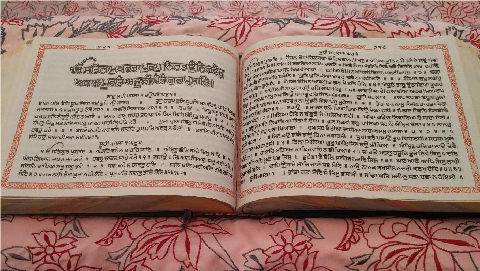BHANA, lit. liking, pleasure, will, wish or approval, is one of the key concepts in Sikh thought. In Sikhism, it refers specifically to God`s will and pleasure. Raza , an Arabic term popular in the context of various schools of Sufi thought, also appears frequently in the Sikh texts to express the concept of UMArSA bhana. According to this concept, the Divine Will is at the base of the entire cosmic existence. It was His bhana, His sweet will which was instrumental in the world`s coming into being: "Whenever He pleases He creates the expanse (of the world of time and space) and whenever He desires He (again) becomes the Formless One (all by Himself)" (GG, 294).
COURT AND CAMP OF RUNJEET SING, THE, by W.G. Osborne, military secretary to Lord Auckland, Governor General of India (1836-42), first published in 1840 in London, is a journal recording events in the Punjab of the period from 19 May to 13 July 1838 and the author`s personal impressions. The author visited Lahore First as a member of Sir William H. Macnaghten`s mission in May 1838, and then in December of the same year with the Governor General during his meeting with Maharaja Ranjit Singh at Firozpur. The journal is preceded by an introduction about the origin and rise of the Sikh people and is followed by a few letters of the author to the Maharaja and one from the Maharaja to the author.
Dard, Hira Singh, an eminent story writer, wrote with a reformatory attitude. He indirectly preached certain reforms keeping in view the realistic side of life. His story \'Rakhri\'1 is of this nature. The character, of the quarrelsome, rude and unlettered Rukmani—the heroine—making her home a hell and over hen-pecked nature of Daroga Prem Nath—the hero—are god realistic i portrayals but at the same time there is a implied suggestion of needed reform in both of them. His famous story \'Pir Gahlur Shah\' is a fine satire on the religious but blind faith of those people who, being uneducated, repose full faith in the hypocritical preachers.
Discover how GIAN sets humans apart through understanding. Delve into spiritual and material knowledge, with insights from Indian philosophy and beyond.
Explore Guru Nanak's historic meeting with Yogi Isar at Sumer mountain, discussing the Supreme Reality's nature and the true spiritual path.
Explore the concept of manas, the mind in Indian thought, its role in perception, emotions, and spiritual connection, bridging the material and consciousness.
Explore the concept of Maya in Indian tradition as the veil concealing reality, its cosmic power, and its unique interpretations in Sikhism.
Explore how Guru Nanak redefined 'qudrat' to embody Divine power and creation, bridging Indian and Arabic traditions with a unique philosophical vision.
- 1
- 2









